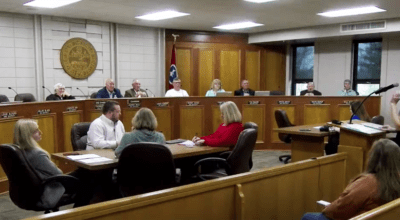
The breach by Neal Pinkston of the Tennessee nepotism ban may be wrong, it may be actionable by the state, it may get Mr. Pinkston in trouble with his attorney general conference pals. But it is not one that directly harms members of the public.
By David Tulis / NoogaRadio 96.9 FM
The office of the comptroller of the treasury is chiding Mr. Pinkston for hiring in March 2015 former newscaster Melydia Clewell as his assistant and chief of staff and marrying her and keeping her on the job. Mr. Pinkston also put Ms. Clewell’s brother on the DA staff in 2020.

Other prosecutorial wrongs are far more significant, and tell painfully about Americans’ loss of liberty under commercial government and the surveillance state, one described aptly by legal historian Roger Roots in The Conviction Factory; The Collapse of America’s Criminal Courts (Livingston, Mont.: Lysander Spooner University Press, 2014, 289 pp.).
Two would include the effective imposition of a bill of attainder, automatic criminalization and a system of general warrants upon classes of people traveling privately and freely on the public road, and, secondarily, rejection of the constitutional ban of warrantless searches.
The DA in Hamilton County routinely prosecutes cases against people not subject to the statute being enforced — Title 55, the motor and other vehicle law, applicable upon people in the trucking and commercial trades on the roadway — and routinely redefines the words “public offense” to mean “any crime” in the law giving exceptions to the constitutional ban (see T.C.A. § 40-7-103) on warrantless arrest. Nowadays a few people are arrested under warrant; MOST should be arrested that way, as provided in the state’s supreme law in the interest of civil liberty.
A warrant is judicial approval of an arrest beforehand. Custom and usage in Hamilton County and every other county in Tennessee skip that necessity, and give judicial OK of an arrest AFTER the jailing of the person, either by the magistrate on the person’s arrival, or by a general sessions court judge at a probable cause hearing or arraignment.
Because there is no opposition by prosecutors, we live under a system of general warrants.
As Mr. Pinkston’s political rival for the office, attorney Coty Wamp, has argued, it would be inconvenient for cops to have to get the warrant first because they would have to let an alleged offender go. Miss Wamp has trumpeted the comptroller’s report.
Pinkston favors Clewell
Nepotism is “bestowal of patronage by public officers in appointing others to positions by reason of blood or marital relationship to appointing authority. State ex rel. Robinson v. Keefe, 111 Fla. 201, 149 So. 638,” Black’s Law Dictionary. The professionalism of employment is part of the rise of commercial and authoritarian government in the U.S. Civil service standards do away with the longtime spoils system of municipal government — and its many advantages to the public.
The law in Title 8 is clear as to whether the nepotism law applies to Mr. Pinkston’s office.
Within each governmental entity, no state employees who are relatives shall be placed within the same direct line of supervision whereby one (1) relative is responsible for supervising the job performance or work activities of another relative; provided, that to the extent possible, this chapter shall not be construed to prohibit two (2) or more such relatives from working within the same state governmental entity. [emphasis added]
Tenn. Code Ann. § 8-31-103
The law refers to state employees. The law does not apply to county employees. The courts have ruled on this limit to the nepotism law to state people only.
Wooley next argues that defendants violated Tenn.Code Ann. §§ 8–31–101 through 8–31–107, known as the Tennessee State Employees Uniform Nepotism Policy Act of 1980 (“the Nepotism Act”). The Nepotism Act provides that “no state employees who are relatives shall be placed within the same direct line of supervision whereby one (1) relative is responsible for supervising the job performance or work activities of another relative.” Tenn.Code Ann. § 8–31–103. Wooley contends that defendants violated the Nepotism Act by allowing Bond to directly supervise his sister. Defendants assert, however, and that court agrees, that since the Nepotism Act applies only to state employees, Bond, as an employee of Madison County, is not subject to its provisions. Thus, Wooley cannot use defendants’ alleged violation of the Nepotism Act to establish the second element of her prima facie case. [Emphasis added]
Wooley v. Madison Cty., Tennessee, 209 F. Supp. 2d 836, 846
The law says a “governmental entity” is as follows —
(1) “Governmental entity” means any state agency, authority, board, commission, department, or office within the executive or judicial branch of state government or any autonomous state agency, authority, board, commission, department, office, or institution of higher education; *** [Emphasis added]
A state, not county, office
Treasury comptroller Jason Mumpower, in a report saying Mr. Pinkston is in breach of the law, says
The position of district attorney is established by state law and therefore a district attorney’s office is a govenmental entity.
He goes on to say,
a state employee is any person who is employed by a governmental entity. DAG’s offices receive funding from various state, federal and local governmental sources. County funding does not change the status of the DAG’s office as a governmental entity nor the status of employees within the office as state employees. Furthermore, changing the funding source for a position from state to county does not remove the DAG’s office from the application of the Nepotism Act. [Emphasis added]
Records indicate that Ms. Clewell and her brother were paid by state appropriations, he says.
The investigation was prompted by county commissioner Tim Boyd, whom Mr. Pinkston prosecuted for extortion over a political threat Mr. Boyd made in course of an election campaign.
No evidence of favoritism
The report says no evidence exists that Mr. Pinkston played favorites with those connected to him by marriage.
Nepotism statutes and policies are designed to avoid conflicts of interest and to reduce favoritism or the appearance of favoritism. Although the DAG’s office is in violation of the Nepotism Act, Comptroller investigators did not find any evidence of favoritism regarding salary increases *** .

